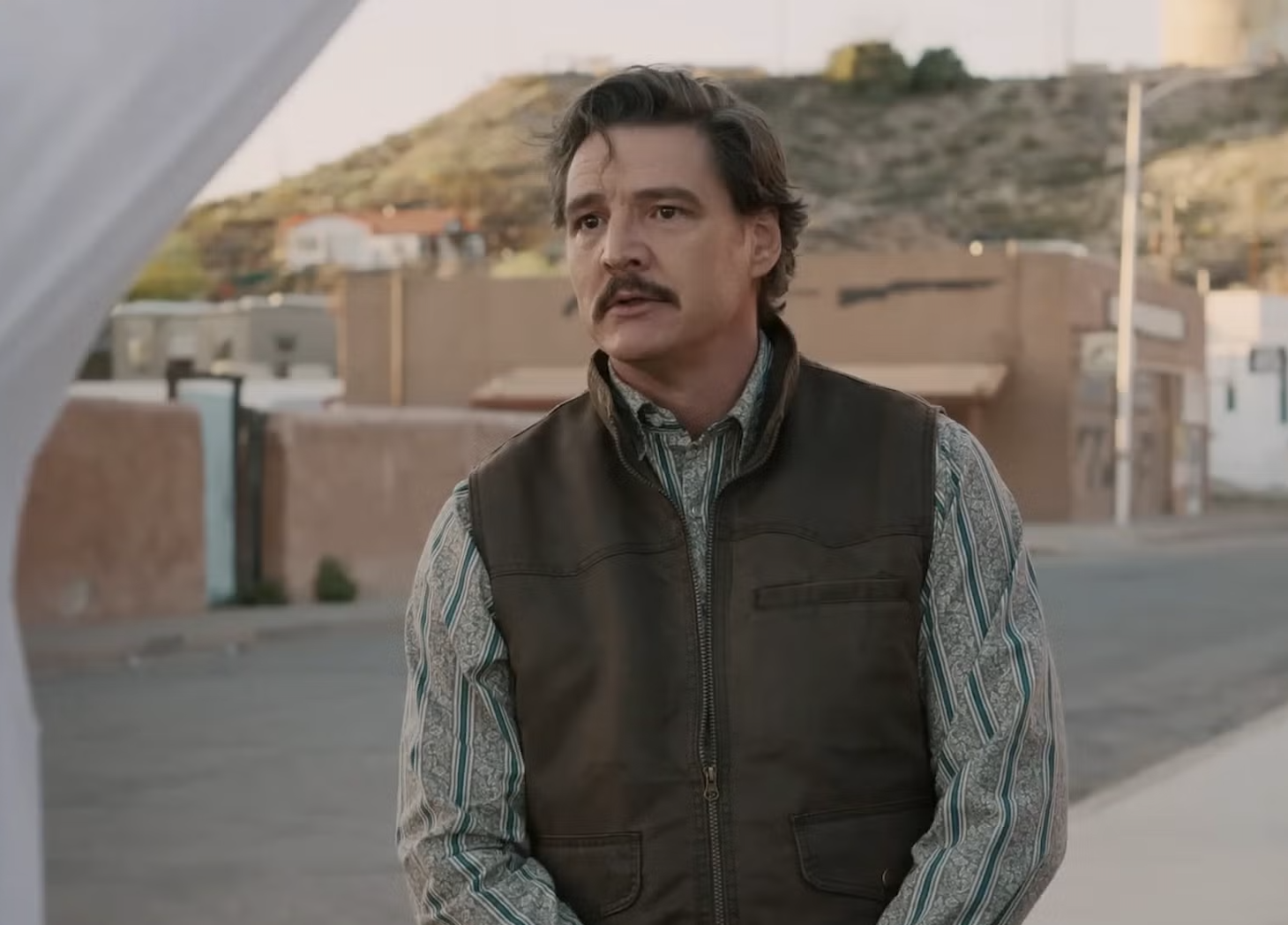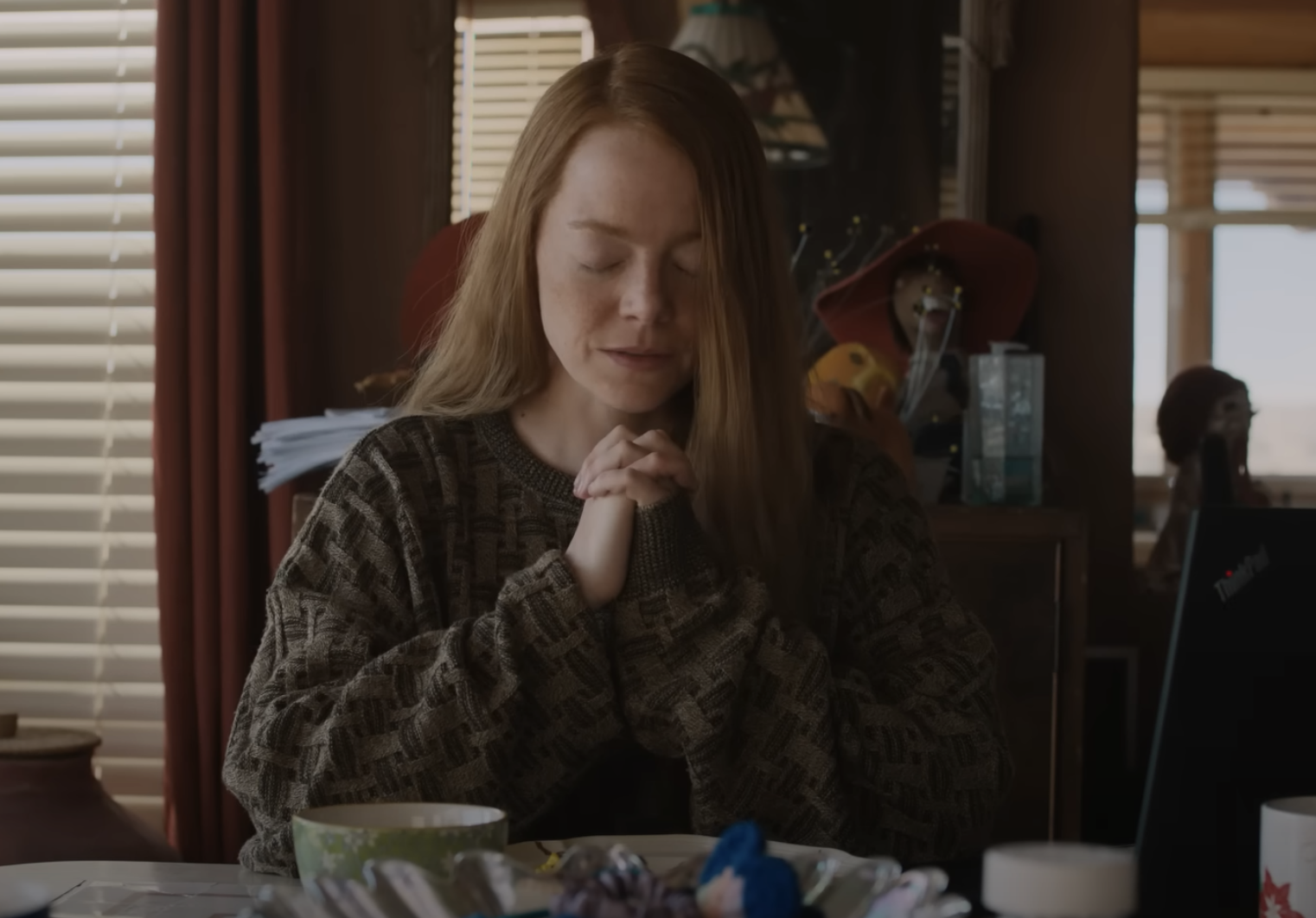Writer-director Ari Aster tends to end his narratives in careening mayhem that finally exhausts itself in an absurdist state of entrapment. Midsommar, his best film, makes use of the conventions of the folk horror subgenre in order to achieve this end effectively. Hereditary, a big success that made Aster famous, was also protected by horror genre conventions, though after a promising start, I found it so silly as to be unendurable.
Eddington is like Hereditary (2018) and Beau Is Afraid (2023) in that it reflects his eagerness to make a full dive into the ludicrous, wrenching around the characters and plot events in ways that defy all narrative probability, apparently for the entertainment of that one guy in the sixth row of the theater whose hacking laugh indicates he finds it all incredibly funny.
It would be wonderful to get snapshots of the rest of the audience members during the protracted last sequences of these Aster films, as their faces begin to register faint puzzlement and then steadily squinch up in scornful disbelief until they reach a final state of complete disdain.
Among his avid fans, Aster gets credit for making hilarious “black comedy” that can’t even raise a bleak chuckle among nonfans. Eddington had a sickly debut weekend, though it’s not tanking as absolutely as Beau Is Afraid did. Still, one would-be wit among box-office trackers was inspired by the numbers to note that “Eddington is Deadington.”
And it’s too bad, because Aster’s got skills. His production designs are consistently a feast for the eye — the overall shooting and editing of his films demonstrates a great deal of control — his actors tend to be well-cast and give good performances. This is all true of Eddington, which in its early sequences is compelling enough to have made me think this time I’d finally really appreciate what people admire about Aster’s films.
Then he lost me again.
Eddington is a “satirical black comedy” set in the small town of Eddington, New Mexico, during the COVID lockdown period. The increasingly fraught conflicts within the town get centered on the hostilities between the local sheriff, Joe Cross (Joaquin Phoenix), and the mayor, Ted Garcia (Pedro Pascal). A few fraught encounters over proper masking in public places catalyze the conflict — Mayor Garcia is for it, though in annoyingly smug liberal tones, while the shriller conservative Sheriff Cross, an angst-ridden defender of traditional values, is decidedly against. Soon Sheriff Cross is running for mayor against the incumbent, riding around town shouting through a bullhorn in a homemade campaign vehicle painted all over with hysterical-looking signs that say things like “YOUR BEING LIED TO.”
Theirs is only the most obvious conflict in town where it seems the COVID lockdown is driving Americans toward peak crazy. Cross has continual run-ins with the local Pueblo tribe’s police force led by Officer Butterfly Jiminez (William Belleau), who claims jurisdiction over the land adjacent to Eddington, though Sheriff Cross is always disputing the boundary line. Local youths, amped up by the social media coverage of Black Lives Matter (BLM) riots across the nation after the George Floyd murder, spill out into the empty streets shouting incoherently while Cross and his deputies insist they’re blocking the nonexistent traffic.
But often, this fraught neo-Western focuses on Eddington’s dusty, deserted streets that have the eerie, suspended look of desert towns in old classic Westerns when the big shootout between gunslingers is about to begin. There’s one scene in particular when you expect the pistol-packing Sheriff Cross to say, “Draw!” and shoot Mayor Garcia down. But the circumstances are incongruous: Garcia is hosting a sociable campaign event at his spacious hilltop home, and someone has called in a noise complaint. Cross stalks through the gathering pulling the plug on all the news coverage and music playing, and soon he and the mayor are in a contest involving one pushing up the little levers controlling the music and the other pushing them down again.
Finally, Garcia slaps Cross across the face, twice. The “showdown” ends in a way that’s typically humiliating for the sheriff, who seems helpless to deal with any of the conflicts that erupt in Eddington.
In the film’s first scene, a ranting, mentally ill homeless man is trying to break into the local bar, which is owned and operated by Mayor Garcia. Sheriff Cross is reluctant to deal with the problem, but when he does, it’s clear he only has one move to make in such situations: the use of force. And he’s no good at public displays of force. His attempt to grapple physically with the distraught man only ends in his own mortifying defeat. Then he goes home to his mysteriously withdrawn and troubled wife, Louise (Emma Stone), who rejects his attempts at lovemaking and may never have accepted any such attempts. Her unstable mother, Dawn (Deirdre O’Connell), also lives with them during COVID lockdown and ratchets up the domestic tensions.

Mother and daughter are both increasingly addicted to the wild conspiracy theories generated in all media, which leads them to the creepy ministry of Vernon Jefferson Peak (Austin Butler). His gatherings apparently offer solace to the traumatized, particularly those who’ve suffered sexual abuse. Louise’s participation will lead to some dire revelations about the relationship between Louise and her late father, a former sheriff whose large, framed photograph dominates their home in a disturbing front-and-center altar arrangement including a silver urn that presumably contains his ashes and a permanently lit candle.
Meanwhile, Mayor Garcia’s son Eric (Matt Gomez Hidaka) gets involved in a teenage love triangle pivoting on the local blonde heartbreaker and social justice influencer Sarah (Amélie Hoeferle). She’s the leading firebrand in the town’s Black Lives Matter demonstrations. Eric’s Mexican heritage gives him an “authentic” advantage with her that his jealous white friend Brian (Cameron Mann) doesn’t have. In an effort to impress Sarah, Brian begins a desperate gambit to claim Angela Davis as his inspiration for spewing leftist organizer jargon with fake earnestness. Eventually Brian outdoes all his peers in his loud, microphone-hogging insistence that as a white heterosexual male, he has no right to speak at all and will continue to reiterate that point at some length.
There’s more, but you get the idea. In Aster’s view, all of these people are equally antisocially insane. Some can put up a calmer front than others, like Mayor Garcia with his smoothly adamant arguments in favor of building an enormous water-hogging data center in a draught-stricken community because it’ll supposedly provide jobs. But all are lashing out in a self-righteous frenzy that refuses to consider the views of others, pro-maskers and anti-maskers alike, BLM advocates who protest and those who despise them and want them all locked up.
Aster represents a mysterious planeload of heavily armed “extremists” flying in at a climactic point of guns-crazy chaos who are never identified as far as where they come from, whom they represent, or what they stand for. The plane features an ambiguous logo showing a cartoon hand closing itself over the globe. Dressed in all-black ninjawear, these assailants who infiltrate the hills around Eddington might be government-hired Blackwater-type mercenaries, oddly well-financed “antifa,” or some other group altogether.
Aster’s both-sidesism — all-sidesism — make it a surprise that he’s willing to establish through late-breaking events in the narrative that COVID is a real, highly contagious disease and not just a government hoax or an example of mass hysteria.
Eddington is an example of the hybrid film genre known as Western noir. It’s a fascinating genre because of the way it exposes contradictions in American mythology and the consequences of our continued belief in that mythology. In certain scenes, Eddington works well in those terms.
There’s a moment, for example, in the midst of the chaos when Sheriff Cross awakens suddenly and sits up, automatically drawing a nonexistent gun so that he’s pointing his fingers like a child about to say, “Pow pow.” It’s a nice moment that’s both silly and a bit scary as his helpless psychological state turns more and more toward the gun as his entire way of dealing with the world. It represents a phenomenon we’ve always seen a lot of in this country, so perhaps we’re wrong in thinking it’s more widespread and lunatic than it’s ever been before.

There’s a related scene in No Country for Old Men (2007), the Coen brothers’ masterpiece of Western noir, which has many of the same themes as Eddington but is an infinitely more powerful film. Aster is an admirer of the Coens’ body of work and must be aware of the ready comparisons. No Country also features an “overmatched” sheriff in a rural Western town who’s increasingly reluctant to “push my chips forward” against the kind of violence and crazy callousness he’s seeing unleashed in his community — though he’s told by his uncle, an old lawman himself, that what he’s facing is nothing new in a country that’s always been hard on people and has “got the devil in it.”
But at one point, the sheriff feels driven to confront this devil and stages an abortive high-noon-style gunfight. At the moment to “draw,” his elusive opponent is simply not there, and the sheriff finds himself facing his own shadow on the opposite wall in a classic gunfighter pose. It’s both a haunting image and a darkly absurd one. It evokes our disastrously romanticized history of conquering the Western territory through macho but supposedly honorable violence, a John Wayne movie fantasy imposed over the grim facts of white settlement, robber baron expansionism, and Native American genocide.
Aster’s more scattershot approach in Eddington has none of the coherence or command of No Country for Old Men, but it does reflect his own generalized state of anxiety. As he frequently discusses in interviews, Aster is “afraid of everything.” He’s a hypochondriac who hates the experience of being embodied even when the body is feeling well. Socially, he finds that sane and wholesome people fill him with as much dread as insane and unwholesome ones. Politically, the Left is crazy, the Right is crazy, the center is crazy, all positions are crazy. A charging gnat is as fearsome as a charging rhino.
And after a while, that kind of proud neuroticism is pretty monotonous. The worst of Eddington is that for all its loud chaos, it’s a boring vision of the world.
Great Job Eileen Jones & the Team @ Jacobin Source link for sharing this story.



